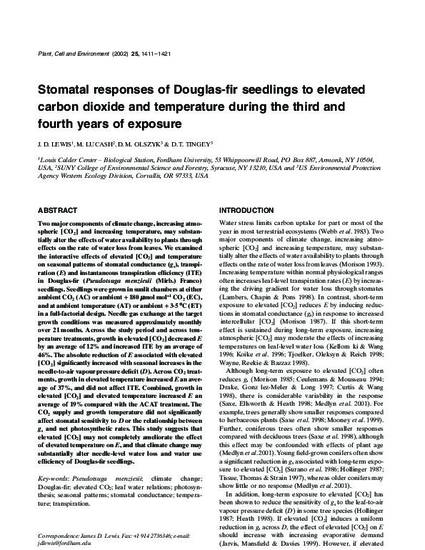
- Acclimatization (Plants),
- Photosynthesis,
- Douglas fir -- Growth,
- Carbon dioxide
Two major components of climate change, increasing atmospheric [CO2] and increasing temperature, may substantially alter the effects of water availability to plants through effects on the rate of water loss from leaves. We examined the interactive effects of elevated [CO2] and temperature on seasonal patterns of stomatal conductance (gs), transpiration (E) and instantaneous transpiration efficiency (ITE) in Douglas-fir (Pseudotsuga menziesii (Mirb.) Franco) seedlings. Seedlings were grown in sunlit chambers at either ambient CO2 (AC) or ambient + 180 µmol mol-1 CO2 (EC), and at ambient temperature (AT) or ambient + 3.5° C (ET) in a full-factorial design. Needle gas exchange at the target growth conditions was measured approximately monthly over 21 months. Across the study period and across temperature treatments, growth in elevated [CO2] decreased E by an average of 12% and increased ITE by an average of 46%. The absolute reduction of E associated with elevated [CO2] significantly increased with seasonal increases in the needle-to-air vapour pressure deficit (D). Across CO2 treatments, growth in elevated temperature increased E an average of 37%, and did not affect ITE. Combined, growth in elevated [CO2] and elevated temperature increased E an average of 19% compared with the ACAT treatment. The CO2 supply and growth temperature did not significantly affect stomatal sensitivity to D or the relationship between gs and net photosynthetic rates. This study suggests that elevated [CO2] may not completely ameliorate the effect of elevated temperature on E, and that climate change may substantially alter needle-level water loss and water use efficiency of Douglas-fir seedlings.
To the best of our knowledge, one or more authors of this paper were federal employees when contributing to this work. This is the publisher’s final pdf.
The published article is copyrighted by Wiley Blackwell and can be found at: URL http://dx.doi.org/10.1046/j.1365-3040.2002.00923.x
